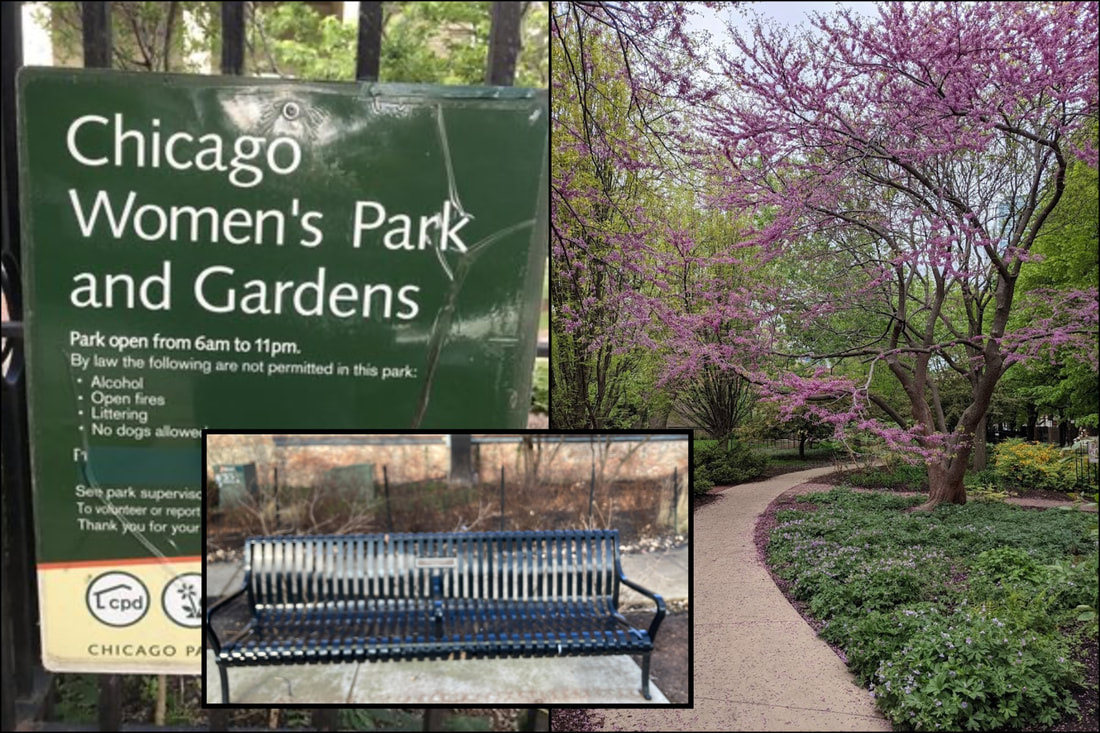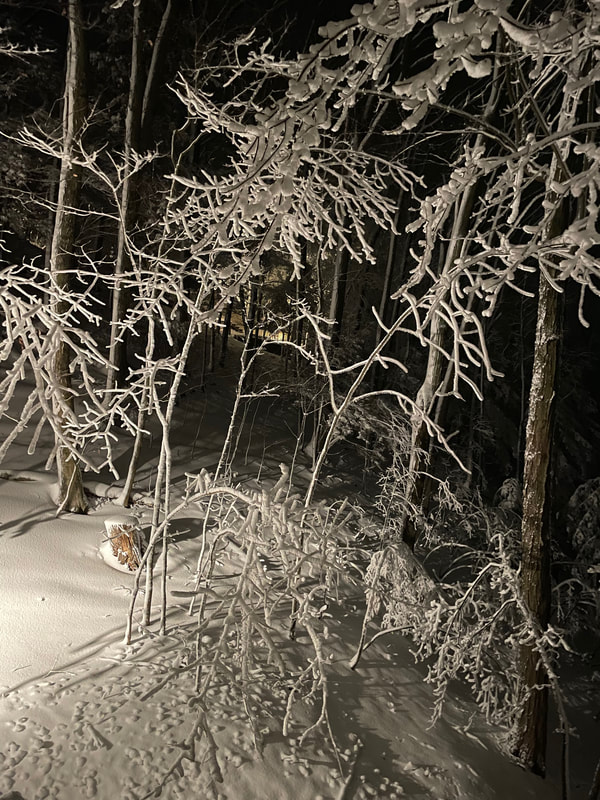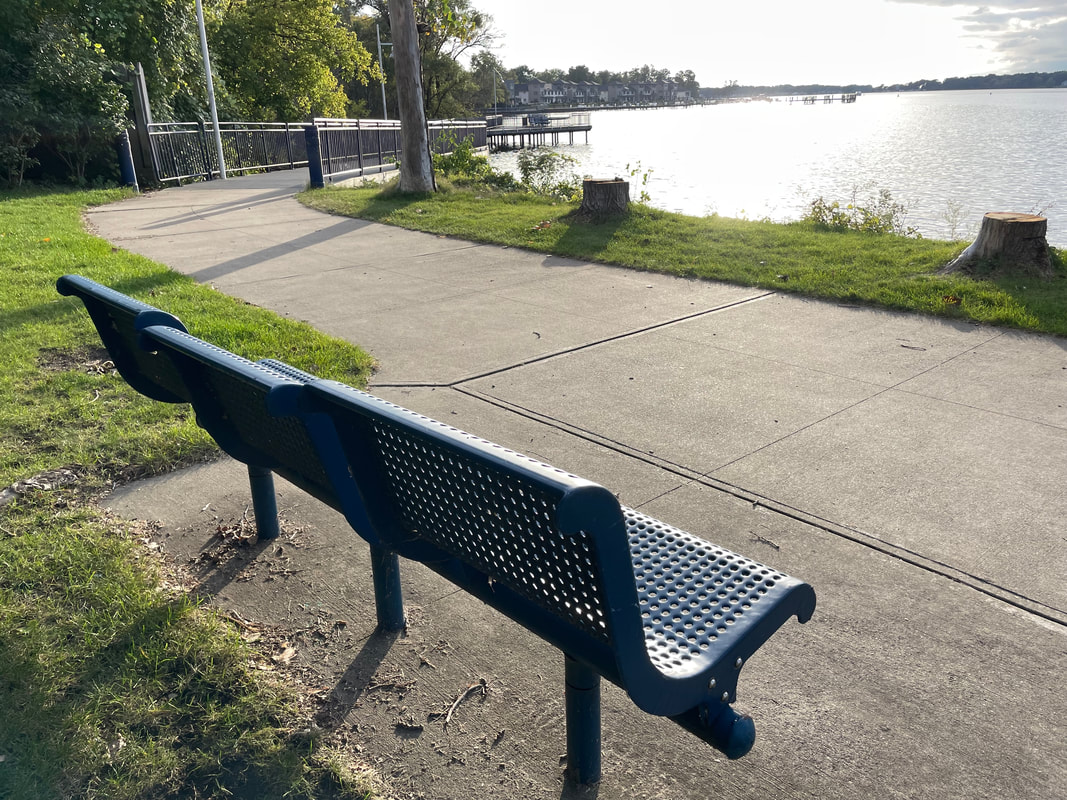|
Birthday Ribbons Seven years ago, my little sister died very suddenly a week after her husband’s heart attack. We are a small family – just the two of us and our parents came as refugees in the 50’s. My sister and I were close – a kind of phone call every day close. She had a wicked sense of humor and our calls were filled with laughter and we expected to be old ladies together now that our families were launched.
I grieved for her and ached for her. There is no burial plot to visit, nowhere to talk to her of my sadness. Until…… Across the street from my home, at the Women’s Park in Chicago, a memorial bench to a friend, surprised me one day and I immediately made arrangements to honor my sister. Now I have somewhere to visit my beloved sister, to decorate the bench with ribbons for her birthday, to clean around it so others can enjoy the beautiful spot comfortably. The bench has lightened my pain. M.O. of Chicago
0 Comments
By Dirk Hollebeek I don’t consider myself much of a joiner but recently my wife and I joined a book club, my first but not hers. There are a lot of Reformed pastors and teachers in the group, and so, the first book selected was The Blood of the Lamb by Peter De Vries, an author I had never heard of let alone read. I would later hear him compared to Paul Schrader. Both are artists deeply acquainted with the Reformed subculture and critical of it, using novels or film as their preferred expressions. The Blood of the Lamb is perhaps best described as a semi-autobiographical work of fiction. The main character, Dan Wanderhope, grows up in a Dutch Calvinist household in Chicago only to reject that religion, just like De Vries. Don and his wife have a child named Carol who contracts leukemia, mirroring De Vries’s actual daughter. The disease’s diagnosis, subsequent treatment, and dooming complications form the second half of The Blood of the Lamb. In the penultimate scene, Wanderhope enters the hospital carrying a cake inscribed with Carol’s name, meant to celebrate her impending discharge after achieving remission. Instead, Wanderhope witnesses Carol’s release of a different kind, as result of a rampant infection that consumed her in a way the cancer was unable to do. Her blood, once full of cancer and then temporarily and terminally full of germs, choked her body of life. As he speaks his last goodbye to his daughter’s body, he whispers simply, “Oh my lamb.” Wanderhope goes outside and finds himself opposite St. Catherine’s church. Remembering the boxed inscribed cake, he removes it carefully and, finding his target, hurls it full force at the crucified Christ statue on the church’s exterior. It hits Jesus’s face squarely. As the cake and frosting dribble down the stone Savior’s body, Wanderhope slumps to the worn front steps, not to repent or pray, but to rest before continuing onward. Wanderhope does go on, and the days and weeks pass, but he and De Vries remain steadfast in not looking to the divine for healing, hope, or peace. The concluding paragraph of the book begins with “Time heals nothing–which should make us the better able to minister.” It goes on to suggest that all that suffering can bring is a shared experience and subsequent comradery but nothing else. “How long is the mourner’s bench upon which we sit,” Wanderhope ponders, “arms linked in undeluded friendship, all of us, brief links, ourselves, in the eternal pity.” I related to a great deal of The Blood of the Lamb. Like Carol, I struggled with illness as a child. De Vries’s descriptions of inpatient pediatric hospital wards, while set in the 1950s, mirrored my experiences in the late ‘70s, from the roommates to the playrooms to the whispered conversations between doctors and parents just out of earshot but not from view. And when Wanderhope narrated the events that led to Carol's leukemia diagnosis, I read those sections aghast and open mouthed, occasionally wiping away tears. I had been diagnosed with Acute Myeloid Leukemia (AML), early in 2018, and after achieving remission, received a bone marrow transplant later that spring. In the days before my AML diagnosis, I shared Carol’s experiences of fatigue, fevers, headaches, and general malaise that are more typically associated with colds and the flu. The blood work results reported by the real doctor in my life and the fictional one in Carol’s changed everything. There is a knowledge gained from being an oncology patient, a knowledge no one willingly chooses. A knowledge about how time, priorities, and expectations shift with just a few words over just a few seconds. Suddenly, life becomes not about plans or a future, but merely about survival. As De Vries puts it, “The future is a thing of the past.” Survival is everything. Surviving the cancer, surviving the treatments, surviving the complications. Surviving damning statistics. Surviving. It is harder than it sounds. At the beginning of my treatment, the nights were usually the most difficult as I would wake up randomly with a variety of symptoms. It might be nausea, pain, or discomfort. Early in the chemo, I would wake with the common side effect of night sweats. Gown, diaper, sheets, blankets, completely drenched, and I would wake with a start because I was shivering, teeth chattering. On the worst night, it happened twice. Each episode was another obstacle to overcome by calling the nurse, drying off, and changing clothes while the sheets and blankets were being switched, settling in, and trying to warm up again. I would shiver for half an hour under a pile of blankets before I would start to warm and then kick them off so as not to overheat and become even more nauseous. Sometimes that would work and I would sleep the rest of the night. Sometimes it wouldn’t, and I would start another day of chemo and struggle exhausted. However, most sleepless nights were not caused by these conditions but by a restless mind. The emotional and spiritual battles that raged equaled my physical battle for life. In the dark, partly illuminated by the various screens of monitors and pumps, I would look out the window and wonder. I have come to understand why humanity has historically been afraid of the dark. Everything is a little more overwhelming in the silent darkness. Numbers, percentages, and survivability statistics are more jagged in the dark. I would despair over the starkness of facing a life-and-death disease full in the face. I thought of those who face life threatening disease alone. How do they manage? It’s lonely enough in a crowd of supporters. And with faith. At other times, I would remind myself that there is nothing I did to deserve this disease. It was not a reckoning, a judgment, or a curse. It is cancer. Savage, faceless, merciless. It does not respond to emotion nor demands nor pleas. I did not bring this on myself, or on my family or my community. It simply descended on me. Every person who has heard the word “cancer’ as part of a diagnosis has walked the road of denial and rationalization. There is a relentless outpouring of self-defending anecdotes and comparisons (even if never uttered aloud) to demand leniency. But all the defenses, all the best excuses, don’t matter. Rationalizing doesn’t shrink a growth, and reasoning doesn’t change blood counts or pathology reports. Cancer doesn’t care who or what you are. Speak all your evidence, demand all your rights and entitlements, share your unfulfilled dreams. And be prepared for silence. Cancer isn’t listening. It wasn’t listening to Peter De Vries or his daughter, Emily, the inspiration for The Blood of the Lamb’s Carol. She died in 1960 after struggling with leukemia for two years. I have always maintained, even on the worst days of nausea and/or sudden and irreversible incontinence and/or nerves being damaged by the chemo with a sensation of burning flame and/or a fatigue so deep that I felt glued to my bed, that it could be worse. Worse, for me, would be if cancer had happened to my wife, Stacey, or one of our children. It is precisely this scenario that De Vries experienced and shares through Wanderhope–facing the worst possibilities, struggling to hope while being surrounded by sick children and their stricken but imperfectly enduring parents. As an adult patient, I was spared the charade of perpetual positivity that oncology parents must exude, save when our children would visit. De Vries had no such luxury. In the end, he finds nothing to bring solace but a metaphorical bench upon which humanity can and should sit to commiserate and minister to one another. Not in faith, but in sorrow. And not in belief, but in loss. I find the image and idea of this bench compelling for its invitation. For its honesty. For its openness. Particularly as the bench in my mind is a ragged old bench, repurposed from beams and iron spikes that held another function centuries ago. They now have been painstakingly assembled by the master carpenter, a man of sorrows, acquainted with grief, to comfort people in their time of deepest distress. It is a mourner’s bench large enough for the world, small enough for me. And you. A place for all to join. Photo and story provided by Jeffrey Munroe, author of the new book, Telling Stories in the Dark: Finding Healing and Hope in Sharing Our Sadness, Grief, Trauma, and Pain, and editor of the Reformed Journal, where this story first appeared. The Mourner's Bench was posted with the permission of the author, Dirk Hollebeek.
On a bench shielded from the afternoon sun by seven cottonwood trees, Mother and I watched the parade of boats, birds and people alongside Lake Macatawa for years. The only bench on the south side of the lake offering such protection from the afternoon sun, it was a favorite. We called it “Cottonwood Corner.” Mother wrote a poem about it titled “Peace and Tranquility”—for surely the bench offered that to all who paused along the Heinz Walkway to savor a summer afternoon. And then one October day, the trees were gone. Several showed signs of disease last summer—so we were not surprised. But we were crushed. Without shade to protect eyes increasingly sensitive to light or paper-thin skin susceptible to cancer, how could we enjoy the lake? Thanks to the many people who have read our book, Miracle Within Small Things, or heard our story about the importance of making nature more accessible to seniors, we had money to replace the trees—to save one of the few shaded benches in the area. But how to make it happen? I have heard from several people it took years and lots of frustration to get their cities to add a bench or a tree—features they were willing to fund to honor a loved one. And then I heard from others, it was easy. The difference—Chicago, Saugatuck, Muskegon—have an online donor application process in place to manage requests. Holland does not. Fortunately, Ken Freestone, a former city council member, came to our aid—setting up a meeting with Andy Kenyon, the director of the Holland Parks and Recreation Department. In less than a minute, we had our trees—new maple trees that will be planted along the Heinz Walkway this spring! As Holland is in the final two weeks for public comments on the Parks and Recreation Master Plan, if you live in Holland or have ever visited its many parks, please send an email to Andy at a.kenyon@cityofholland.com prior to January 12th. Message: Please adopt an online donor program to make it easier for people or organizations to donate senior-friendly benches and trees to our parks. It will help make nature accessible to everyone, regardless of age. It’s a message that should go to all community governments across Michigan and the country. While Mother is in her 98th year, this spring we plan to once again stroll along the walkway to a favorite corner, shaded by maple trees. Peace and tranquility are always welcome gifts. THANK YOU to all who purchase our book and provide presentation stipends to hear our story. The monies will continue to fund shaded benches in Michigan communities—hopefully a goal made easier by community online donor programs.
A special thanks to West Michigan Garden Clubs including the Petal Pushers of Kalamazoo, Carnegie Garden Club of Paw Paw, Three Rivers Club of Little Garden, Thornapple Garden Club of Hastings, the Village of Appledorn, Freedom Village, Hope Academy of Senior Professionals, the Saugatuck Woman’s Club, Wedel’s Garden Center of Kalamazoo, Reader’s World Bookstore (which stocks our book), the Herrick District Library (which selected our book as a 2024 Book Group to Go book), as well as individuals who have made private donations. Please, come see our trees in 2024—and enjoy the view from a shaded bench you helped make possible! |
Author, Poet, PhotographerFrom briefcase to pen, paper and camera, one woman's journey to influence how we care for the environment, our seniors, each other. Due to technical difficulties, comments are not posting correctly to this site. Please contact me with thoughts while I work through this issue. Thanks for understanding.
|




 RSS Feed
RSS Feed
